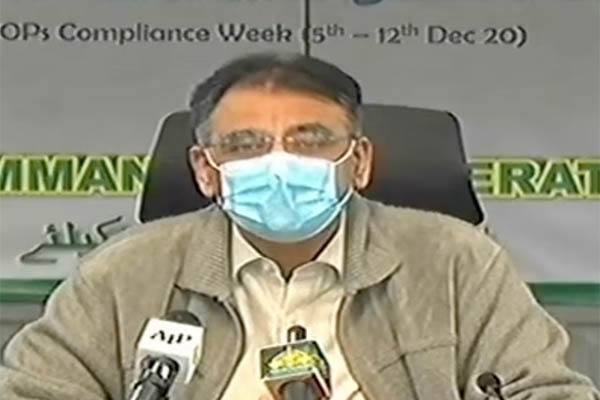
Planning Minister Asad Umar. Youtube
Planning minister claims opposition’s statements on pandemic ‘not spreading in rallies’ send a dangerous message
The government will have no choice but to close more sectors of the economy if the public does not adopt preventative measures to curb the spread of the second wave of the novel coronavirus, Planning Minister Asad Umar announced on Wednesday.
Addressing a press conference after a meeting of the National Command and Operation Center—which he also heads—he admitted that the decision to close some sectors such as educational institutions and wedding halls had been “painful.” However, he warned, if the public continued to ignore government-issued guidelines, then “within a week or two, the situation might deteriorate to a point where we are forced to close even more sectors.”
Summarizing the sectors already impacted in a bid to curb the spread of COVID-19, Umar said the government had announced early vacations for educational institutions; banned indoor wedding receptions; limited to 300 participants allowed at outdoor weddings; banned indoor dining at restaurants. “We worry about the education of children; we know that a lot of Pakistan’s educational institutions charge low fees and they have been severely damaged by the closures,” he said, adding that thousands of livelihoods were at risk due to the wedding and restaurant restrictions.
“But we have to do this, because if you can save 100 peoples’ livelihoods at the cost of one person, then you must take that decision,” he said, adding that the government would deliberate a on a relief package for these closed sectors in a meeting of the National Coordination Committee tomorrow (Thursday).
Rallies and messaging
The planning minister said the government had also limited to 300 the number of people allowed at political gatherings. “This guideline is not being implemented,” he said. “Not only is this dangerous because the virus spreads when thousands gather in one place … more dangerously, when people hear their leaders say that rallies don’t spread coronavirus; that it’s a political statement, they reduce or stop adhering to SOPs,” he warned, noting that rallies only impacted a few thousands present at the venue, but the message reached millions across Pakistan.
“The biggest difference between the first and second waves [of the coronavirus] is that the message is not being conveyed,” he said. “We [government and opposition] had differences of opinion on preventative measures in the first wave, but our message was the same. This time, this is not happening,” he added.
Noting that the government had met ulema and doctors—front-line workers—in the past week, Umar praised their dedication and efforts to adopt SOPs. He said the media too had ramped up awareness campaigns to stress preventative measures. “Democracy does not allow political leaders to take decisions—and send a message to the public—that endangers people’s health and livelihoods,” he said.
Worrying data
Earlier, the planning minister noted that in the week of Oct. 12, Pakistan had recorded a positivity ratio of 2 percent. “Last week, this had risen to 8.7 percent,” he said, noting this was a fourfold increase. “That same week in October, we were recording around 8 deaths/day; this has now also risen to around 60/day,” he said, noting that a fourfold increase had been witnessed in almost all COVID-19 statistics. “Unfortunately, we are not seeing the level of adoption of SOPs that we saw in the first wave,” he said, claiming this was the only way to successfully counter the second wave.
